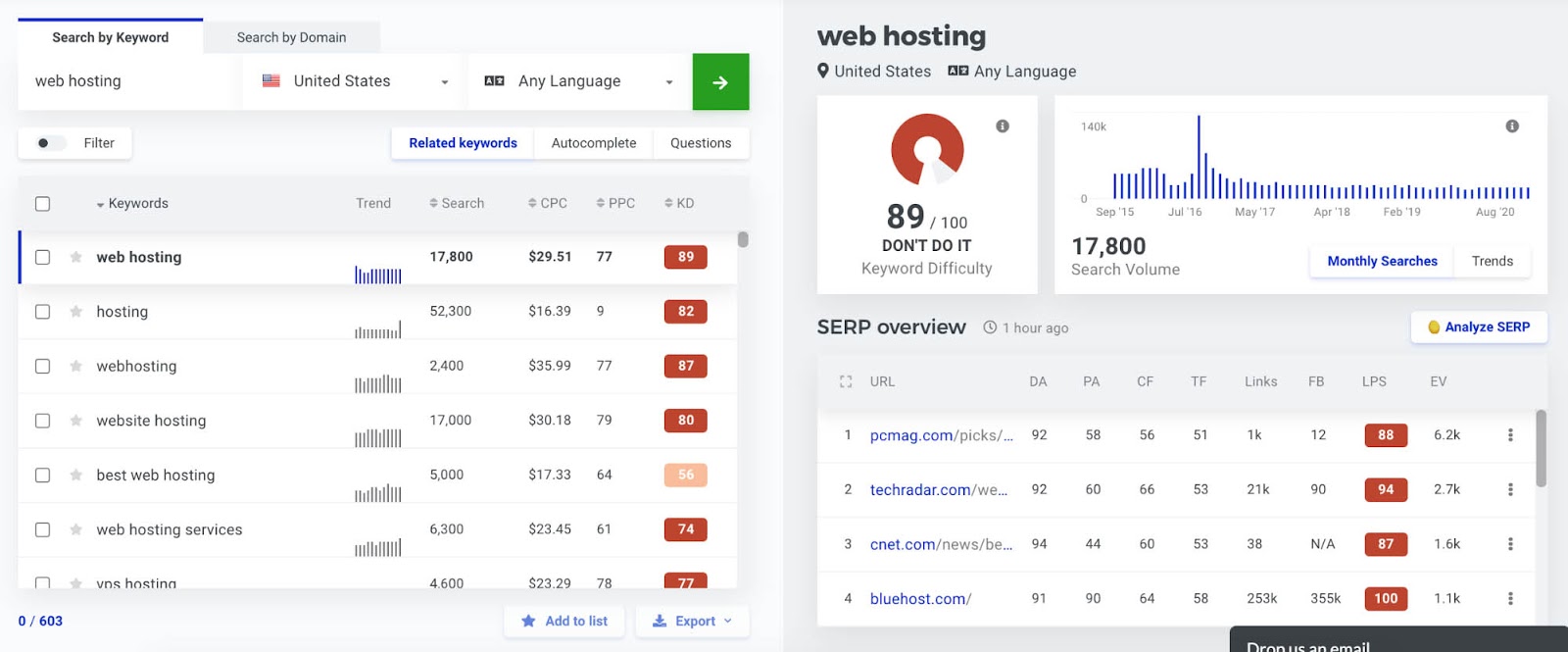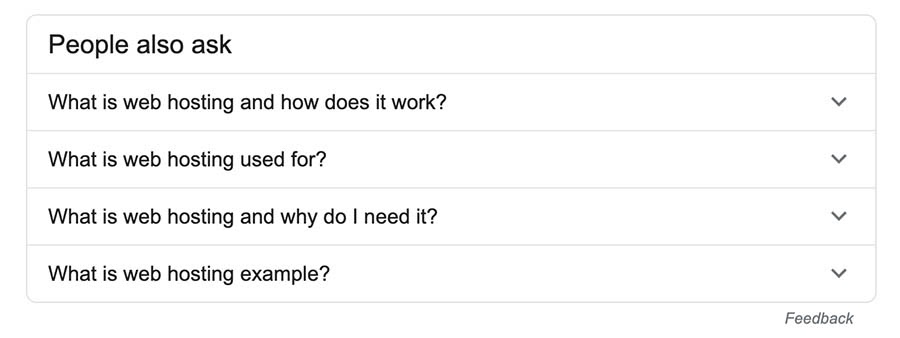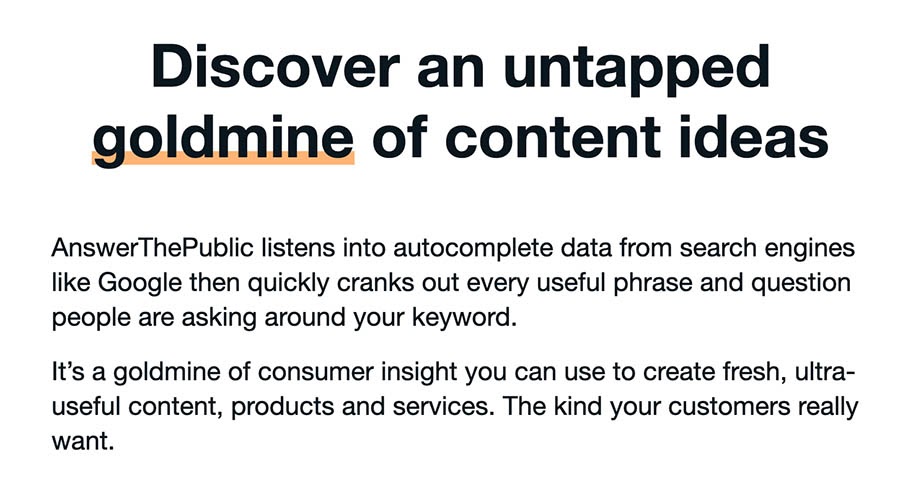How to Determine the Most Valuable Keywords to Target

Quick question for you: What are two of the most important elements of SEO?
Link building and keywords — specifically, choosing the right keywords and using them in the right way.
No ifs. No buts. Keywords are important to any SEO strategy. Choose the wrong keywords (or use the right keywords in the wrong places) and your website will suffer.
Stick with us, and we’ll cover keyword essentials including what keywords are, why keyword research is so important, and some of the very best tools you can use for carrying it out (keyword research, that is).
Or, if you’re already familiar with some of the ins and outs of keywords, just use the links below to skip to a section (or sections) that catches your eye.
What Are Keywords?
Keywords are the words or phrases you enter into a search engine, the goal being to locate something — maybe a product or an answer to a question — online.
So why do keywords matter so much, especially to online marketing?
Simple. They matter because placing the right keywords on the right pages of your site can boost your performance in the SERPs (search engine results pages) and increase your organic traffic. And who doesn’t want that?
Why Do Keyword Research? Why Not Just Guess?
Keywords differ in three main areas. Quite a lot.
- Search volume: How many people are searching for a particular keyword
- Competitiveness: The Domain Authority (DA) and PageRank of the sites currently ranking for a particular keyword
- Intent: What the user is looking to find when entering a keyword into a search engine
An effective keyword research process helps you determine the best keywords for you to target on your site.
Why is keyword research specific to each site?
Because not all sites have an equal ability to rank. Far from it, in fact.
Factors including the age of the domain, the number (and quality) of links pointing at it, its DA and PageRank, and the quality of the site and its content — all these (and more) affect a site’s ability to rank.
In short, keyword research matters because it helps you target phrases you have a realistic chance of ranking for. It’s also a useful tool for checking the intent behind a particular keyword, whether it matches who you’re trying to target and what you’re trying to achieve.
We take the guesswork (and actual work) out of growing your website traffic with SEO.Search Engine Optimization Made Easy

Understanding Keyword Types
Broadly speaking, there are two keyword types:
- Short-tail keywords
- Long-tail keywords
As a generalization, short-tail keywords are very competitive and typically have transactional intent behind them.
Long-tail keywords are longer phrases. As a result, they tend to have a much lower search volume than short-tail keywords. That said, they’re more specific than short-tail keywords so they (depending on the keyword, of course) can have much higher conversion rates.
They also tend to be far less competitive than short-tail keywords. And even better, while keyword stuffing can become an issue if you focus on just one or two short-tail keywords, you can include many, many long-tail phrases on the same page. Not only will this help you rank for more terms, but it’ll also satisfy how Google uses semantic keywords to better understand the contents of a page, its subject matter, and its relevance.
However, there’s more to keyword types than length. As mentioned above, one of the biggest differentiators between keywords is the search intent behind them.
Understanding these differences is critical to determining how valuable a keyword is likely to be to you, your site, and your business.
Search intent can be mostly categorized into four types:
- Transactional
- Navigational
- Informational
- Commercial investigation
Transactional Keywords
This describes keywords people search for when they’re at the bottom of the sales funnel and are looking to buy soon. They’re the most valuable keywords for e-commerce sites. Unfortunately, they’re often the most competitive.
Navigational Keywords
These are used when a person is looking for a specific site. By and large, they’re not something you need to worry about.
Unless . . . your site is failing to rank for its own brand name.
This is uncommon, but it can happen when a company shares its name (or a very similar name) with other companies. Especially if those companies have more established websites and have a higher DA than your own.
In other words, if you’re in the process of setting up a new company, the uniqueness of the name is something worth thinking about.
Related: How to Choose The Best Domain Name (11 Key Tips)
Informational Keywords
This is pretty self-explanatory. Informational keywords are used by people looking for information.
This covers a pretty broad spectrum. Users might be looking to learn about a celebrity, read a movie review, research a subject for their schoolwork, and anything in between.
Informational keywords also include users searching for information on a product.
Commercial Intent Keywords
This is a type of informational keyword. The difference is that it’s specific to people considering a purchase — i.e., those closer to the top of the sales funnel. They are often (but aren’t always) formatted as questions.
For example, consider this high commercial intent keyword: “What is the best web hosting service?” (Yeah, we know what we did there. And no, we’re not ashamed.)
However, an alternative phrase could be “top web hosting services.” (Yes, we did it again.)
Commercial intent keywords are uber-important to anyone with a website that promotes or sells something. So how can you target them?
That depends on the keyword and, largely, how much information is needed to sufficiently answer the query.
A few options include:
- Answering the query within a product description or service page
- Answering it as part of an FAQ section (and then marking it up with schema to grab yourself more space in the SERPs)
- Writing a blog post covering the topic
- Adding a page on the topic as part of a resources section
- Creating a page covering the topic and including it as part of a content hub
Keyword Research Tools
To wrangle up keyword ideas, you’re going to need to use a keyword research tool.
Historically, digital marketers favored Google’s own Keyword Planner. Unfortunately, over time, Google has made changes to the tool, resulting in it becoming increasingly impractical for use in organic keyword research.
Keyword Planner today remains the go-to tool for anyone researching keywords for Google Ads, but if you’re performing keyword research for SEO, you’re going to need to branch out.
So what do you choose?
There are loads of options. And you’re probably going to want to use more than one. The right tool for your keyword plan depends on a few things, such as your budget and the type of keywords you’re researching.
Tools for Transactional Keywords
A couple of our favorite tools for researching transactional keywords are KWFinder and Keyword Keg.
Both are super powerful tools for transactional keyword research, but they can be used to research commercial intent and informational keywords too.
They both also provide similar data. This includes search volume, keyword difficulty scores, and cost-per-click (which is only really useful if you’re using the tools for paid ads research.)

They do have a few differences, though.
Keyword Keg calculates the estimated financial value of each keyword. It also automatically pulls in difficulty score data, whereas on KWFinder you have to manually click each keyword of interest (not a massive problem, but it can slow you down.)
On the other hand, Keyword Keg pulls in data for a very limited number of countries. For international keyword research, KWFinder wins — hands down.
Both have similar pricing plans — around $20 to $30 a month for the average user. Big agencies can expect to pay more.

Tools for Informational and Commercial Intent Keywords
Once again, there are countless options. So we’ll stick with pointing you toward our favorites. AlsoAsked and Answer the Public.
AlsoAsked is completely free to use. Answer the Public is free, to an extent. If you use it a lot, you may need to upgrade to a Pro account.
So what’s the difference between them?
As the name suggests, AlsoAsked pulls in the “people also asked” data from Google.

You could get this data yourself, directly from Google. But AlsoAsked will streamline and shorten your workflow. Since it’s free, using it is kind of a no-brainer.
Answer the Public uses autocomplete data. Don’t quote us on this, but while this data used to be pulled from Google, ATP made some changes that now means it relies on autocomplete data from other search engines.
Note below how they say: “search engines like Google”.

Not that this makes it any less valuable, however.
Other Keyword Research Tools
Here’s a tip for you: there’s another way to perform keyword research.
Instead of using tools that show keywords you can potentially target, you can look at what keywords you’re currently ranking for and incorporate giving them a boost into your SEO strategy.
How can you do this?
Both Semrush and Sistrix have massive databases of keywords they track internally. This means you can put in any URL or domain (yep, any — so you can keep an eye on your direct competitors) and get a list of keywords that URL or domain ranks for.
You can then look at which keywords are valuable to you and which keywords you’re already ranking well for but, with some work, could push further up the SERPs. You can then target them for higher positions and more traffic.
Semrush has recently added Keyword Magic, a keyword tool that is a very worthy competitor for Keyword Keg and Keyword Finder, mentioned above.
Better yet, if you’d like to try it (and all of Semrush’s other awesome features), we’ve arranged a completely free, 14-day trial with their team. Interested? You can sign up for your trial here.
Another very useful tool for this is Google’s Search Console, which is also free and an invaluable resource for any website owner or marketer.
What Search Console doesn’t let you see is what other sites are ranking for.
Keyword Takeaways
By now, you should have a decent grasp on choosing the right keywords and why it matters, including…
- What keywords are and why the different types matter
- Why keyword research is a must-do and which tools you can use
- Perhaps most important of all, why this is all so darn important
That said . . . if you’d prefer someone else to take charge, we’re here to help!
DreamHost offers an expert SEO marketing service. You’ll get your own SEO team that includes SEO strategists, WordPress developers, and content writers. You’ll also enjoy month-on-month improvements, custom content creation, and detailed monthly reporting. Learn more about our SEO marketing services today!

